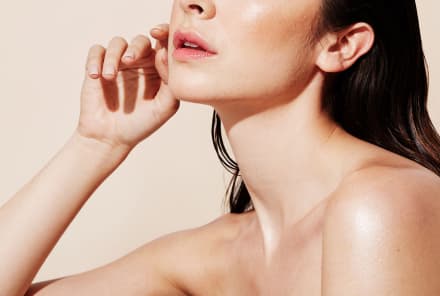Advertisement
Bee Propolis Benefits For Skin Health: What The Research Says + How To Find A Quality Product


In the health and wellness crowds, bee propolis has become a household staple for those in the know. The bee product has protective, healing properties—both for the bees who use it in their hives and folks who harvest it for medicinal use.
Regular users I've spoken to swear up and down that it's saved them from sore throats and common colds. (Here, I should note that research on the extract's specific medicinal uses is still growing, so some of the stronger health claims associated with propolis use aren't substantiated at the moment.)
Up until recently, I'd really only seen its use in throat sprays, supplements, or various other tinctures.
But then I saw the ingredient used in a serum I was testing out and wondered: Does this extract have the same protective effects externally as it does internally? So I dug into the research to find out.
Here's what to know about skin care's next buzzy (sorry, had to) ingredient.
What is propolis?
It's actually a mix of bee saliva, beeswax, and collected bits from surrounding plants that the bees collected while flying around.
The result is a substance that's antibacterial2, antifungal3, antimicrobial4, anti-inflammatory5, and chock-full of free-radical-fighting antioxidants. In fact, researchers have identified over 500 compounds6 that can be in propolis, but it's important to clarify that the specific constituents in propolis vary greatly depending on the region.
This is because the final substance is dependent on bee species, available botanical sources, and environmental conditions (propolis is found in tropical and subtropical forests). So the specific benefits of propolis depend on where and how it's sourced.
Historically, propolis has been used as a medicinal tool dating back centuries—and in modern times, research is just beginning to understand the healing effects of the extract.
Potential full-body benefits of propolis
"It contains a whole variety of health benefits," integrative medicine physician Amy Shah, M.D., previously told us about the substance. "There are hundreds of natural antibacterial compounds, amino acids, and polyphenols7. It's most significantly known in history for its infection-healing abilities, and Egyptians even used it during mummification."
Here's what some of the research says:
- In one double-blind study, children given propolis (along with antibiotics) recovered from a respiratory tract infection significantly faster8 than the participants given antibiotics alone.
- Another research review touts propolis as a complementary agent to enhance the immune system9
- Research has also shown that bee propolis can ease pain and irritation10 due to its anti-inflammatory and antioxidant capabilities.
- Research reviews show that it may even help support the health of those dealing with chronic disease, thanks to the antioxidant effects of the polyphenols in propolis11. In fact, a 2022 review showed it may support those with Type 2 diabetes6.
The research is promising; however, more studies are needed in order to fully understand propolis' effects on human health—especially as it relates to specific conditions.
Why it's becoming a buzzy skin care ingredient
It's not rare for wellness products to find their way into the beauty aisle. Astaxanthin was a popular supplement for years before it started showing up in antioxidant serums, as is the same for many popular nutrients like coenzyme Q10, resveratrol, and glutathione.
Really, it's no surprise then that propolis would make its way into face creams eventually. In fact, it's quite a popular ingredient in Eastern beauty markets already—however, it hasn't gained mainstream status stateside. Yet.
As new research has started showing just how impressive the skin health benefits are (and broader awareness grows), I suspect that'll change.
Propolis has a robust nutrient profile, which is likely the reason it has a wide range of uses. Specifically for the skin, bee propolis' polyphenol, flavonoid, and amino acid profile12 is particularly impressive.
For example, bee propolis sourced in the Anatolia regions of Turkey13 is high in resveratrol, ferulic acid, quercetin, luteolin, and caffeic acid, among others. This is actually the specific type of propolis used in the skin care I've been testing out from Bee & You.
The Turkish brand (which you can actually find at most Trader Joes) infuses all their skin care products with their proprietary propolis that has five times more antioxidant capacity than other common propolis found on the market.
Can help fight skin damage and aging
Because of this high antioxidant capacity, it is shown to have protective and anti-inflammatory effects, which can benefit the skin.
Essentially, skin damage happens because of free radicals. When the skin is exposed to an onslaught of free radicals (thanks to things like UV rays and environmental stressors), it becomes inflamed and damaged. This damage is essentially many of the signs we associate with premature aging, such as fine lines, dark spots, and wrinkles.
Helps boost collagen production
Historically, bee propolis has been used to help treat wounds and sores. Turns out, there's very good reason for that. Research shows that propolis helps improve the wound14-healing process14. It does this in a few ways, including creating a biofilm over the wound and its anti-inflammatory abilities.
But it also, research shows, helps regenerate and stimulate tissue growth by modulating the collagen production process11.
This is particularly exciting for those looking to use it in skin care, as collagen plays a vital role in the aging process.
Collagen is our skin's structural protein that keeps us looking youthful, firm, and lifted. With age, our natural production of collagen starts to decline, so supporting collagen synthesis is one of the most effective ways to support skin as you age.
Finding a high-quality propolis: What to watch out for
As noted above, not all propolis is created equal. Because propolis is dependent on the plant sourcing available, environmental conditions, and bee health, it's very important to find high-quality propolis. Or else you may not be getting the benefits you've been promised.
Not to mention, sourcing isn't just important so that you get results: Sourcing matters for bee health, environmental concerns, and beekeeper treatment.
Here are some tips for finding high-quality products:
- Look for brands that can substantiate their claims with clinical research.
- Look for certifications, especially when purchasing ingestible propolis: non-GMO, ISO, FDA registered, GMP, organic, and natural.
- Ensure the brand can identify the compounds found in the propolis used in their products with third-party testing.
- Prioritize transparency of sourcing. Since propolis varies by region, it's important to know what area the ingredient is harvested in and how it might influence the propolis' unique properties.
- Since global bee populations have been declining, it's also important to purchase from brands that are investing in bee advocacy.
- Buy from brands that maintain strong relationships with their beekeepers and give back to local beekeeping communities.
Recently I was able to travel to Turkey to visit Bee & You's beehives in the Anatolia region of the country. The brand is certified organic and natural and works closely with local beekeepers. In fact, they use a unique business model called "contracted beekeeping" to secure a sustainable supply of high-quality bee products.
This model means they can work one-on-one with the beekeepers, offering fair trade practices and improved traceability.

The takeaway
Bees are some of our most precious neighbors—whose gifts are seemingly endless. Not only do they keep our wildlife pollinated and our environment in balance, but the substances they make are profoundly helpful.
Just take propolis: This protective, antioxidant-rich bee product has been used for centuries thanks to its medicinal properties.
For the last several years, it's become a popular supplement. And now, it's made its way into skin care—and I, for one, am happy about that.
14 Sources
- https://www.ncbi.nlm.nih.gov/pmc/articles/PMC3872021/
- https://www.ncbi.nlm.nih.gov/pmc/articles/PMC6600457/
- https://www.ncbi.nlm.nih.gov/pmc/articles/PMC8880174/
- https://www.ncbi.nlm.nih.gov/pmc/articles/PMC5874567/
- https://www.ncbi.nlm.nih.gov/pmc/articles/PMC9740431/
- https://www.ncbi.nlm.nih.gov/pmc/articles/PMC9504311/
- https://www.ncbi.nlm.nih.gov/pmc/articles/PMC3753737/
- https://pubmed.ncbi.nlm.nih.gov/14993078/
- https://www.ncbi.nlm.nih.gov/pmc/articles/PMC6335834/#ref9
- https://link.springer.com/article/10.1007/BF02976375
- https://www.mdpi.com/2072-6643/11/11/2705
- https://www.ncbi.nlm.nih.gov/pmc/articles/PMC7036894/
- https://link.springer.com/article/10.1007/s00217-023-04208-x
- https://www.ncbi.nlm.nih.gov/pmc/articles/PMC10752841/#:~:text=Propolis%20reduces%20scar%20formation%20after,more%20stages%20of%20wound%20healing.
Watch Next
Enjoy some of our favorite clips from classes
Enjoy some of our favorite clips from classes
What Is Meditation?
Mindfulness/Spirituality | Light Watkins
Box Breathing
Mindfulness/Spirituality | Gwen Dittmar
What Breathwork Can Address
Mindfulness/Spirituality | Gwen Dittmar
The 8 Limbs of Yoga - What is Asana?
Yoga | Caley Alyssa
Two Standing Postures to Open Up Tight Hips
Yoga | Caley Alyssa
How Plants Can Optimize Athletic Performance
Nutrition | Rich Roll
What to Eat Before a Workout
Nutrition | Rich Roll
How Ayurveda Helps Us Navigate Modern Life
Nutrition | Sahara Rose
Messages About Love & Relationships
Love & Relationships | Esther Perel
Love Languages
Love & Relationships | Esther Perel



















